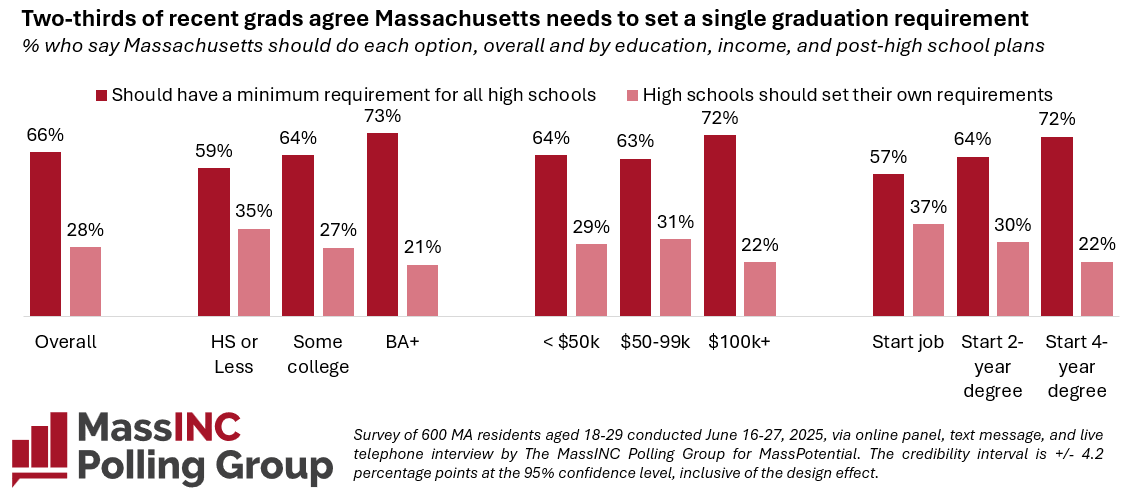Strong Majority of Recent High School Graduates Favor Uniform Statewide Graduation Standards
In the wake of eliminating MCAS as a graduation requirement, Massachusetts graduates support alignment with state university admission standards.
As Massachusetts policymakers craft a post-MCAS approach to high school graduation requirements, a new poll of Massachusetts residents aged 18-29 finds strong support for uniform statewide academic standards. Some of that support may come from experience, as young people have mixed views of how well they were prepared for college or career.
These are some of the major findings of a new survey conducted for MassPotential by The MassINC Polling Group.
Overall, two-thirds (66%) of young people think Massachusetts should have a statewide graduation requirement for all high schools. A similar 67% agree that lowering standards for a high school diploma will lead to graduates being less prepared for the future. Three-quarters support aligning high school graduation standards with the minimum entrance requirements for state colleges and universities (four years of English, three years of math, and two years of science).
“It’s not just that recent high school grads see a need for a common graduation standard,” said Richard Parr, Vice President of The MassINC Polling Group, which conducted the survey. “They also want that standard to be high enough to prepare students for what comes next, whether that be college or a career.”
“Students themselves — based on their own experiences — are telling our policymakers that they value high expectations, and believe that uniform, statewide graduation standards are essential to prepare them for college and career,” said Mary Tamer, Executive Director of MassPotential, a nonprofit organization dedicated to ensuring the success of all K-12 students across the Commonwealth.
“The MCAS will no longer be the objective measure of whether students are ready to graduate, but the Administration’s K-12 Statewide Graduation Council must develop new uniform, statewide curriculum standards, partnered with the right assessment, to prevent a hodgepodge of inadequate and unequal expectations that will lower the value of a Massachusetts diploma.”
Majorities of young people were open to multiple components being part of a graduation requirement, including passing coursework with at least a C (72%); completing courses on financial (74%) and digital literacy (57%); and learning interpersonal and social-emotional skills (62%).
Asked to reflect on their own high school experience, young people offered mostly positive views, but with some room for improvement:
While a near majority felt somewhat prepared (48%) for life after graduation, only 29% felt “very well” prepared.
About half (53%) were happy with the expectations set by their high school, but 33% thought they should have been higher. Nearly four-in-ten (38%) reported that grade inflation happened at least sometimes at their high school, and 40% were aware of social promotion.
Majorities wished their high schools had offered more in terms of financial literacy (82%), career pathways training (69%), vocational classes (66%), and digital literacy (56%).
More than a third (34%) believed their fellow students did not have equal access to the classes and support they needed to meet graduation requirements.
Among those polled, 55% started a four-year college after graduation, while 23% started a job and 14% attended a two-year college. In addition, 60% are currently working full-time, 22% are working part-time, and 22% are still in school. Nearly 60% are living on their own or with friends or spouses, while 40% are living with their parents or other relatives.
About the poll
These results are based on a survey of 600 Massachusetts residents aged 18-29. Responses were collected using a mixed-method approach, including live telephone interviewing, online survey, and text to web, from June 16-27, 2025. Results were weighted by race, age and gender, education, and county to reflect known and estimated population parameters for the cohort. The credibility interval for this survey is +/- 4.2 percentage points at the 95% confidence level, inclusive of the design effect. This project was conducted by The MassINC Polling Group and sponsored by MassPotential.


